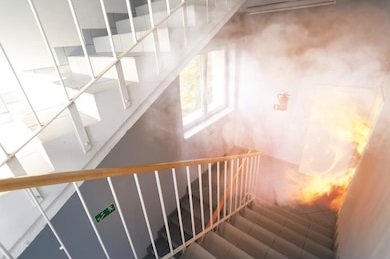Despite heeding warnings of old wives’ tales of burning down an entire town with a cigarette butt or casually combusting from poor taste in pajamas, you are still standing amid a possibly self-inflicted house fire. Maybe you didn’t allow enough space between your bed and a faulty power outlet because you need to keep your charging phone at hand, even in your sleep. Perhaps the cabernet, cats, and candles of self care didn’t mix so well. It’s okay – accidents happen. Playing the blame game is not productive for yourself, or your claim. Reporting your loss won’t automatically leave you pegged as the TV movie insurance scammer (unless that’s who you are).
Because fires are complicated, there is a fair chance that neither the fire department, nor the insurance company will be able to unequivocally pinpoint the cause. What matters is intent. Unless you had premeditated plans to burn down your house, it is unlikely that your claim would be outright denied. Nevertheless, your insurance company may add bumps in the road to compensation, which will inevitably cause delays, especially if you try to journey alone.
After the adjuster surveys the scene, your insurance company may send an investigator to your home to assess potential causes of the fire, even if there has already been a police investigation. Generally, these independent investigators are automatically sent went claims exceed a certain predetermined financial amount, if there has been a severe injury or death, or a third-party may be involved. A legitimate investigator will consult with public responders about the incident, as well as review the fire department’s report to see if what they observe at the scene conflicts with existing descriptions of the claim.
The investigator may ask a series of documented questions, or even conduct a formal examination under oath. These experiences, in theory, are not meant to be accusatory. If you’re forthcoming about the facts of the situation, your lack of malintent stands a greater chance at presenting itself as the truth that it is. But, if an investigator is incompetent or violates your rights—even if the fire was 100 percent not your fault—the result could be a negatively impacted claim. Because your insurance company already employees in-house legal counsel, it is best that you do as well. Lawyers can help clarify the meaning and ramification of certain questions that may be delivered by the adverse party in a misleading way. Like people who burn their houses down on purpose, crooked people in the insurance and investigative fields may be in the minority, but they do exist. Stay tuned for a comprehensive post on the ins and outs of this issue.
In summary, the best of a plan of attack is to hire an attorney, stay calm, and just speak the truth. Chances are, no one at a property investigation is there to take you away in handcuffs, they’re just trying to get to the bottom of a complex and oftentimes ambiguous situation that they hope will play in favor of the insurance company. Life can be a comedy of errors – don’t let it spiral into further tragedy by attempting to navigate an insurance claim without proper guidance.

